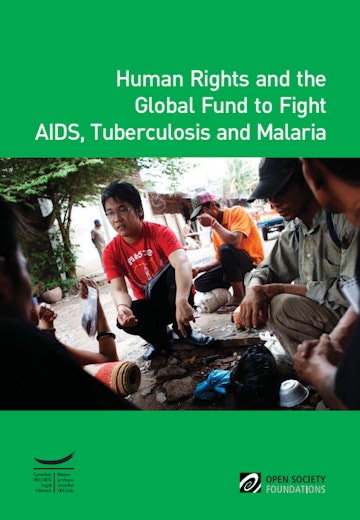The Global Fund to Fight AIDS, Tuberculosis and Malaria is a crucial actor in the worldwide response to HIV. In less than ten years, it not only has provided billions of dollars for AIDS programs, but it has also created processes and collaborations that have opened doors to meaningful participation in public health programs for people living with and vulnerable to HIV.
The Global Fund explicitly espouses human rights-centered approaches to HIV. Yet a truly rights-based HIV response is a challenge to any person or organization because it entails courageous confrontation of sexism, homophobia, moral judgmentalism, unjust criminalization, and cultural norms. This can pose an inherent dilemma for the Global Fund, which claims as a central principle of its work that the programs it funds should result from “country-driven” processes.
The objective of this paper is to examine the human rights content and impact of the Global Fund’s work in three areas—grantmaking processes, grants, and advocacy. The paper examines some ways in which marginalized persons living with and vulnerable to HIV have become empowered through Global Fund processes, including changes in national policies and practices. The paper also addresses ways in which the Global Fund may have inadvertently reinforced activities or institutions that undermine human rights.
Download
-
Human Rights and the Global Fund to Fight AIDS, Tuberculosis and Malaria (678.17 Kb pdf file)
Download the 76-page booklet.
Read more
Vaccine Justice
The Quest to Boost Africa’s Fight Against COVID-19

While Africa consumes 25 percent of the world’s vaccines, only one percent of vaccines are manufactured there. The mRNA vaccine manufacturing hub in South Africa is working to change that.
Rest in Peace
Remembering David Rothman, a Liberator and Pioneer
Rothman, a scholar-advocate of the highest order who had a profound influence on Open Society, wrote on a wide array of subjects concerning ethics and medicine, and helped free thousands of people from involuntary institutionalization.
Valuing Lived Experience
The Need for a Human Rights-Based Approach to Global Mental Health

A growing body of research shows that Western models of mental health don’t work for everyone. When it comes to care or policy, policymakers should first listen to those with lived experience of mental health challenges.
